Summary
– Chinese EVs pose a significant threat to legacy car companies worldwide
– Chinese automakers are projected to capture 33% of the global car market by 2030
– Chinese brands have a cost advantage, quicker model development, and focus on in-cabin technology
– Chinese manufacturers invest heavily in EV technology and manufacturing processes
– The Chinese share of North American car sales is projected to rise from 1% to 3% between 2024 and 2030
Article
**Chinese EV Threat to Legacy Car Companies**
The threat of Chinese electric vehicles (EVs) is very real, with consulting firm AlixPartners projecting that Chinese automakers will have 33% of the global car market by 2030, up from 21% currently. This growth is alarming for established manufacturers like Ford, General Motors, Volkswagen, and Tesla, who may risk irrelevance if they do not adapt quickly. Chinese car companies are known for their high-tech, inexpensive, and stylish electric cars, which are gaining popularity on a global scale.
**China’s Role in the Global EV Market**
China has emerged as a major player in the global EV and battery industries, with a strong focus on innovation and cost-effective manufacturing. Chinese automakers have been able to achieve a 35% cost advantage over other manufacturers through lower labor costs, vertical integration, and government subsidies. The country has invested heavily in EV infrastructure, battery manufacturing, and mining, giving them a significant edge in EV technology and affordability.
**Differentiators of Chinese Automakers**
Chinese automakers differentiate themselves through rapid product iteration, in-cabin technology, and design. They develop new models twice as fast as traditional manufacturers, with an emphasis on over-the-air software updates to add features and improvements over time. Chinese brands like BYD offer innovative, high-tech vehicles at competitive prices, challenging Western manufacturers to keep up with their pace of innovation.
**Impact on the Global Car Market**
The Chinese share of vehicle sales outside of China is expected to rise from 3% to 13% by 2030, indicating significant growth and expansion in international markets. Chinese car companies are positioned to be major competitors in Europe and South America, where they already have a strong presence. In North America, the Chinese market share is projected to increase from 1% to 3% by 2030, despite higher tariffs imposed on Chinese imports.
**Implications for U.S. Consumers**
While Chinese EVs are gaining popularity globally, U.S. consumers may not feel the impact of China’s dominance in the automotive industry as much as other regions. The U.S. currently only receives a few Chinese imports, but the threat of Chinese EVs forcing American manufacturers to improve their offerings remains a possibility. The big question is whether tariffs and geopolitical tensions will limit U.S. consumers’ access to high-tech, stylish, and competitively priced EVs.
**Conclusion**
The rise of Chinese EVs poses a significant threat to legacy car companies, prompting the need for quick adaptation to stay competitive. Chinese automakers’ focus on innovation, cost-effectiveness, and rapid product development has positioned them as leaders in the global EV market. While other regions may feel the impact of China’s dominance more prominently, the potential for Chinese EVs to shape the future of the automotive industry remains a key consideration for manufacturers and consumers worldwide.
Read the full article here


